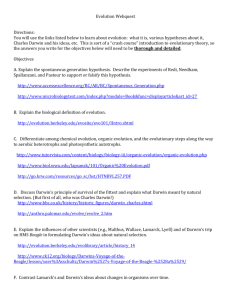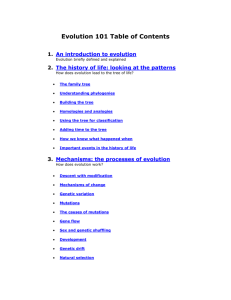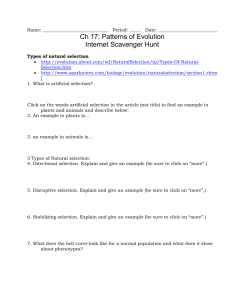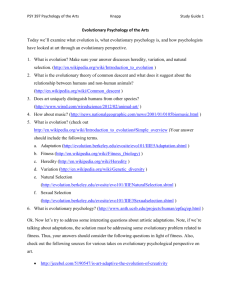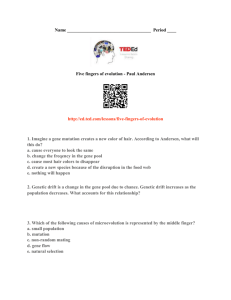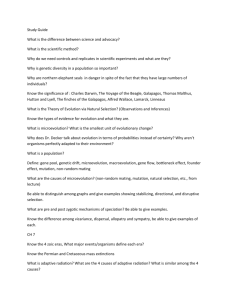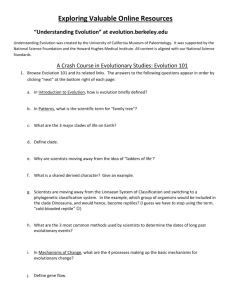11-7-What is evolution-key - LaPazColegioWiki2012-2013
advertisement
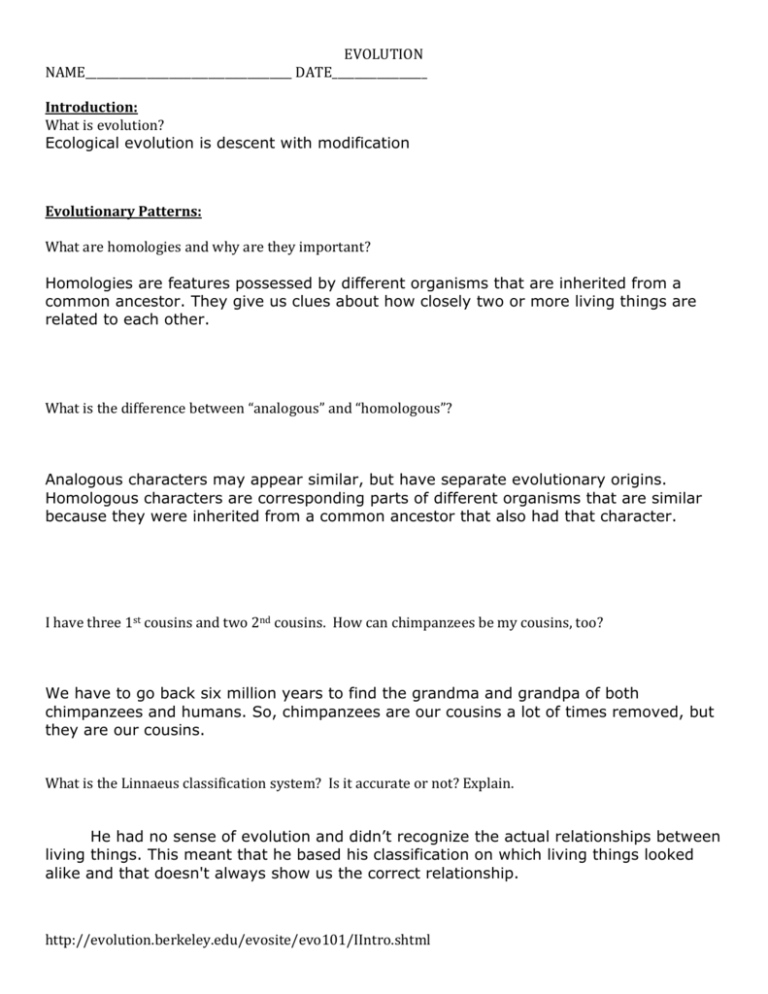
EVOLUTION NAME_____________________________________ DATE_________________ Introduction: What is evolution? Ecological evolution is descent with modification Evolutionary Patterns: What are homologies and why are they important? Homologies are features possessed by different organisms that are inherited from a common ancestor. They give us clues about how closely two or more living things are related to each other. What is the difference between “analogous” and “homologous”? Analogous characters may appear similar, but have separate evolutionary origins. Homologous characters are corresponding parts of different organisms that are similar because they were inherited from a common ancestor that also had that character. I have three 1st cousins and two 2nd cousins. How can chimpanzees be my cousins, too? We have to go back six million years to find the grandma and grandpa of both chimpanzees and humans. So, chimpanzees are our cousins a lot of times removed, but they are our cousins. What is the Linnaeus classification system? Is it accurate or not? Explain. He had no sense of evolution and didn’t recognize the actual relationships between living things. This meant that he based his classification on which living things looked alike and that doesn't always show us the correct relationship. http://evolution.berkeley.edu/evosite/evo101/IIntro.shtml EVOLUTION NAME_____________________________________ DATE_________________ What is a tetrapod.? Are birds tetrapods? Explain. The wings are front legs that don’t look much like legs because they are adapted for flying. http://evolution.berkeley.edu/evosite/evo101/IIntro.shtml EVOLUTION NAME_____________________________________ DATE_________________ Mechanisms of Evolution: Why is sex important for evolution? One reason is that sex introduces genetic variation between individuals, and selection acts upon variation. This gives a population the flexibility to survive environmental change.” What is natural selection? What are the three factors necessary for natural selection? “Variation, differential reproduction, and heredity.” Do species only evolve because of natural selection? Explain. “No, evolution can occur due to genetic drift. This means that just by chance, especially in small populations, evolution can occur without specific selective pressure.” What are the 4 mechanisms of evolution? Certainly. Mutation, migration, genetic drift, and natural selection.” http://evolution.berkeley.edu/evosite/evo101/IIntro.shtml EVOLUTION NAME_____________________________________ DATE_________________ Microevolution: Define microevolution. Is microevolution the evolution of small things? No, microevolution can occur in living things of any size. Microevolution is evolution within a single population. It does not necessarily lead to the evolution of new species, but may do so in the long run How can microevolution happen? “Microevolution can result from mutation, a spontaneous change in DNA; or migration, genes coming into the population from elsewhere; or genetic drift, random selection for a particular gene.” How can gene frequency change? Humans do all have the same number of genes. When I said “gene frequency,” I meant the number of different sorts of gene variants in a population. So if one year there were more eye color genes coding for green eyes, and the next year there were more eye color genes coding for brown eyes, the gene frequency would have changed.” What is artificial selection? How does this compare with natural selection? Humans have been selecting domesticated plants and animals with preferred traits for thousands of years, resulting in major changes to those organisms. Nature has been http://evolution.berkeley.edu/evosite/evo101/IIntro.shtml EVOLUTION NAME_____________________________________ DATE_________________ doing the same thing for billions of years, so artificial selection is an interesting miniature model of what has happened in the evolution of life on Earth.” Why do some people feel we shouldn’t use pesticides, even though the poison isn’t supposed to hurt humans? “When we poison pests, the survivors, if there are any, may be somewhat resistant to our toxins. Their offspring are the parents of following generations, which may become more and more resistant to our efforts to do them in. Then our poison won’t work anymore.” http://evolution.berkeley.edu/evosite/evo101/IIntro.shtml EVOLUTION NAME_____________________________________ DATE_________________ Speciation Define “species”. “A species is usually defined as a group of individuals that actually or potentially interbreed in nature. It’s not a perfect definition, but may have to do for now.” How does one species become two species? “Reproductive isolation is the most common cause. For example, if some flies land on an island with no flies they may evolve into one or more new species that are different from the species where they originally came from.” If things look alike are they necessarily the same species? V “No. Many types of ducks look similar but are different species because they cannot successfully reproduce with one another. A species is often defined as a group of individuals that actually or potentially interbreed in nature.” What is a hybrid? Are hybrids species? (Exe: Zeedonk, Liger, Mule “Usually zebras mate only with zebras and donkeys with donkeys. However, it is not physically impossible for a zebra to mate with a donkey. The offspring of two different organisms is referred to as a hybrid.” If you were to watch a herd of deer for a long time, would you see it evolve into two different species? Explain. “Not likely. Reproductive isolation is probably necessary for speciation. If a population persists in reproducing within itself and sharing genes throughout its range, the species will remain intact.” What’s up with the Galapagos Islands? What has occurred historically that led to so many weird species on each island? “If by “weird,” you mean unique species, it’s because islands often keep animals from interbreeding with those on other islands. This geographic isolation encourages speciation.” http://evolution.berkeley.edu/evosite/evo101/IIntro.shtml EVOLUTION NAME_____________________________________ DATE_________________ Macroevolution Define macroevolution. Macroevolution is the evolution of larger groups than species, like the evolution of mammals or of flowering plants.” Use what you know about macroevolution to explain how insects may have evolved from centipedes. Insects may well have evolved from animals that looked like centipedes through loss of segments and legs. Also, some of the segments fused to look like fewer segments. The thorax, which looks like one part, is actually made of three segments.” Describe the term “static” in terms of evolution. Do you mean stasis? The words are very similar. Stasis refers to lineages that have not changed much over a long period of time. Remember when we talked about the coelacanth being a ‘living fossil?’ That is because its morphology has not changed very much in more than 80 million years!” What else, besides dinosaurs, has gone extinct? Practically everything. Over 99% of the species that have lived on Earth are now extinct What does it mean when we say that all living things are cousins of each other, and cousins share a common ancestor? For example, how can a whale and a rose have a common ancestor How is macroevolution like micro? http://evolution.berkeley.edu/evosite/evo101/IIntro.shtml
